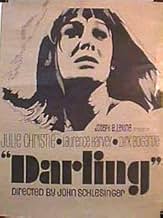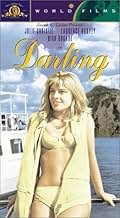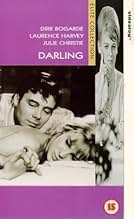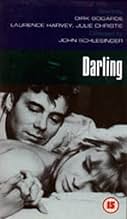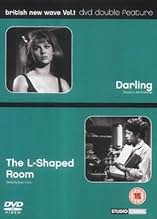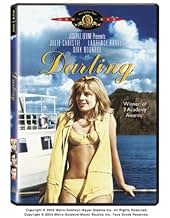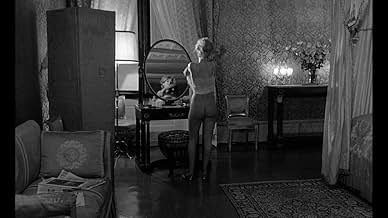IMDb RATING
7.0/10
8.4K
YOUR RATING
Beautiful but amoral model Diana Scott sleeps her way to the top of the London fashion scene at the height of the Swinging Sixties.Beautiful but amoral model Diana Scott sleeps her way to the top of the London fashion scene at the height of the Swinging Sixties.Beautiful but amoral model Diana Scott sleeps her way to the top of the London fashion scene at the height of the Swinging Sixties.
- Won 3 Oscars
- 17 wins & 8 nominations total
José Luis de Vilallonga
- Prince Cesare della Romita
- (as Jose Luis De Vilallonga)
T.R. Bowen
- Tony Bridges
- (as Trevor Bowen)
Featured reviews
Julie Christie deserved her Oscar. So did the scriptwriters--"Should Popes be ancestors?" And no on-screen sex when the film is considerably about sex!
When the lead character becomes a princess one is reminded of Princess Diana's own life. Both are Dianas. A very unusual, complex work from Schlesinger.
I did not appreciate the film when I saw it in the Sixties; now I do. What a great year for Christie--this and "Dr Zhivago."
The social commentary is hard hitting--young black boys serving snacks and drinks to perverted white adults, the facetious interest of the idle rich in feeding the hungry around the world as the rich gobble food they do not need to eat, of rich princes busy renovating their palace's washing closets.
When the lead character becomes a princess one is reminded of Princess Diana's own life. Both are Dianas. A very unusual, complex work from Schlesinger.
I did not appreciate the film when I saw it in the Sixties; now I do. What a great year for Christie--this and "Dr Zhivago."
The social commentary is hard hitting--young black boys serving snacks and drinks to perverted white adults, the facetious interest of the idle rich in feeding the hungry around the world as the rich gobble food they do not need to eat, of rich princes busy renovating their palace's washing closets.
Julie Christie is "Darling" in this 1965 film directed by John Schlesinger, and also starring Dirk Bogarde and Laurence Harvey. Schlesinger does a beautiful job of showing us '60s London as it was, and yet he managed to make a film that is just as timely now.
Julie Christie is model Diana Scott, a gorgeous, ambitious young woman who moves from man to man without attachment and with the intention of helping her career.
She dumps her first husband and breaks up the marriage of a British journalist (Bogarde) and then moves on to a pleasure-seeking advertising executive (Harvey), and finally, marries an Italian prince.
It's one of those lives that sounds great - she has beauty, money, men, glamour, travels in the circles of the beautiful people. But she has no emotional attachments, no love, and nothing that she has feels right or is anything she wants. All the external trappings of celebrity, but it's a shell.
A really terrific movie, and I have to agree with the posters whose comments I read that Julie Christie is perfection in every way. Bogarde and Harvey give her excellent support. As an aside, Christie's wardrobe is stunning.
None of the characters are very likable, except perhaps Bogarde, who in spite of leaving his wife and family does truly love Diana.
Despite the cold realities of Darling, we're even more obsessed with celebrity today, which makes the film even more interesting. But when you look at a photo, see someone in a magazine or on the screen, you're only dealing with a persona, not the flesh and blood individual. It's a fantasy.
Darling shows the audience what's behind the fantasy - and it's not very pretty.
Julie Christie is model Diana Scott, a gorgeous, ambitious young woman who moves from man to man without attachment and with the intention of helping her career.
She dumps her first husband and breaks up the marriage of a British journalist (Bogarde) and then moves on to a pleasure-seeking advertising executive (Harvey), and finally, marries an Italian prince.
It's one of those lives that sounds great - she has beauty, money, men, glamour, travels in the circles of the beautiful people. But she has no emotional attachments, no love, and nothing that she has feels right or is anything she wants. All the external trappings of celebrity, but it's a shell.
A really terrific movie, and I have to agree with the posters whose comments I read that Julie Christie is perfection in every way. Bogarde and Harvey give her excellent support. As an aside, Christie's wardrobe is stunning.
None of the characters are very likable, except perhaps Bogarde, who in spite of leaving his wife and family does truly love Diana.
Despite the cold realities of Darling, we're even more obsessed with celebrity today, which makes the film even more interesting. But when you look at a photo, see someone in a magazine or on the screen, you're only dealing with a persona, not the flesh and blood individual. It's a fantasy.
Darling shows the audience what's behind the fantasy - and it's not very pretty.
I find this movie unique. If you have read of, or can remember the mid-1960s, you know that the character Julie Christie plays was absolutely the one adored by everyone- by all who considered themselves "in" and "trendy" and "modern". And she is completely taken apart by this movie.
I can think of only one other movie at any time in any language that so thoroughly demolishes the pretensions of the very people whom the smart set aspired to be at the time the movie was coming out. Amazingly that movie was 'Alfie', that came out about that same year. (A movie like La Dolce Vita is in a different mode - the people are the new meretricious post-war haute bourgeois class - a frequent target through history, and in that way, like The Ice Storm or Interiors or American Beauty as an attack on such values).
Virtually all "serious satires" take on targets that the "chattering classes" consider suspect - the hidebound, the hypocritical, the "authority figures" whom youth wish to overturn. Not this one. Astonishingly, in the midst of mod London, the very middle of the swinging 60s, you get a movie that looks at its non-committal "live for the moment" hedonistic experimentation and blasts its moral character with a cannon.
This just doesn't happen in movies - compare say, "If" or "O Lucky Man" or say, "Network" (to name three I like), and you'll see the targets as the familiar powers that be - from school to television. But Julie Christie's character is what people thought was new and wonderful - and its superficiality is blown to bits.
It's as if a movie now were to look at a poor black woman raising a child alone - and blast her for any behavior that contributed to this state. It just won't be done - the sympathies are all running FOR that character. So were the sympathies for the Julie Christie character in that time - and the movie is very very brave in running so utterly against the current.
I just love the movie - it's a step up from Schlesinger's earlier ones -the script is superb, the performances are excellent without exception. (Lawrence Harvey is particularly good - but of course it's Christie's movie).
Do see it. It's also full of wonderfully imaginative touches - such as the ending scene.
I can think of only one other movie at any time in any language that so thoroughly demolishes the pretensions of the very people whom the smart set aspired to be at the time the movie was coming out. Amazingly that movie was 'Alfie', that came out about that same year. (A movie like La Dolce Vita is in a different mode - the people are the new meretricious post-war haute bourgeois class - a frequent target through history, and in that way, like The Ice Storm or Interiors or American Beauty as an attack on such values).
Virtually all "serious satires" take on targets that the "chattering classes" consider suspect - the hidebound, the hypocritical, the "authority figures" whom youth wish to overturn. Not this one. Astonishingly, in the midst of mod London, the very middle of the swinging 60s, you get a movie that looks at its non-committal "live for the moment" hedonistic experimentation and blasts its moral character with a cannon.
This just doesn't happen in movies - compare say, "If" or "O Lucky Man" or say, "Network" (to name three I like), and you'll see the targets as the familiar powers that be - from school to television. But Julie Christie's character is what people thought was new and wonderful - and its superficiality is blown to bits.
It's as if a movie now were to look at a poor black woman raising a child alone - and blast her for any behavior that contributed to this state. It just won't be done - the sympathies are all running FOR that character. So were the sympathies for the Julie Christie character in that time - and the movie is very very brave in running so utterly against the current.
I just love the movie - it's a step up from Schlesinger's earlier ones -the script is superb, the performances are excellent without exception. (Lawrence Harvey is particularly good - but of course it's Christie's movie).
Do see it. It's also full of wonderfully imaginative touches - such as the ending scene.
Darling (1965)
A black and white, Mod London romance and its aftermath, over and over, with all the tumult and glitz of the times. The events race forward and create a real tornado of activity, centering around one woman, Diana Scott, who is perfectly played by Julie Christie. Diana is as charming and beautiful as the actress who plays her, and she is drawn to men, to the movies, to modeling, and generally to success and ruin, up and down, in a wild ride.
British movies had a vigorous neo-realism (British New Wave) movement in the late 50s and early 60s, and by the time of this film it had segued into a purely celebratory pop mode, cashing in on the times, and the British Invasion in music. "Darling" is kind of in both worlds, I think, the same way the 1964 "A Hard Days Night" is in both, though they are very different films. But there is a frankness to the filming that belies the (at first) entertaining and largely fictional subject. And unlike the earlier neo-real innovators ("Loneliness of a Long Distance Runner" etc.), the focus here is on a privileged class, and on the rising fortunes of Diana as she moves from one relationship to another.
The filming gives these seemingly flighty, alternately glib and sad events a somberness they need. Director John Schlesinger was a British New Wave upstart, and would later do the American masterpiece "Midnight Cowboy," which might be said to have the same mixture of inventive fiction and believable raw realism.
Diana is a superficial woman who cashes in on her good looks and fun temperament, and her many men never seem to mind at first. She leads, but she also get towed along, falling in love, never seeming to be quite as happy as she should. Indeed, the movie begins with her explaining through a voice-over her inner yearning for what matters in life, since it's so hard to otherwise tell. Toward the end, in Italy (after England and France had been exhausted), she says to her newest man, "If I could just feel complete." And she means it. But then, in the next scenes, she's having fun again, telling lies and losing her bearings.
Christie is a marvel, really, even though you might just say she's playing herself (though not acting out the events in her life, we hope). This is her breakout film (along with her next film, "Dr. Zhivago"), and she really does typify the Mod English girl, fresh and carefree. There is even a very brief nude shot, from behind, that is a sign of mid-60s liberation in both life and in filmmaking. Dirk Bogarde is certainly excellent, too, and subtle, and indeed the whole cast is first rate, maybe because everyone is playing their contemporary selves with fictional names.
So the movie is terrific, even if it sometimes seems to keep meandering through the paces over the whole two hours. It wraps you in its world. Inevitably the outcome is as somber as the greys of the filming. What else would happen to someone who can't find love, or happiness, or meaning? It's impossible to really feel complete, as a person, if you search outside yourself too much, and hers is a superficial world of her own making, Diana is a superficial woman with lots of unexplored depth.
The writing here is totally first rate, the filming is first rate, the editing and pace first rate. It's simply a well made movie about a contemporary dilemma. "Thank God it's never too late," she says at the end, and in fact you know that she should really say, "God, everything stays the same." I don't think there is meant to be an echo here of Grace Kelly in particular, but there is a similar arc to Diana's career (and her name, of course, predicts a later Princess Diana). Diana's apparent sexual freedom is laden with that old convention of marriage (which she early on wisely says she doesn't want) and so some extent she can be a freewheeling young woman partly because she is always taken care of, and increasingly so. An interesting take on whether this is an accurate picture at all of the times is in this short apolitical article: www.socialistreview.org.uk/article.php?articlenumber=10813.
This movie ranks, for me, almost up there with "Alfie" and "Georgie Girl" (two of my favorites) as a look at the times in England. Honest, sometimes disturbing, and artistically considered. Don't miss it.
A black and white, Mod London romance and its aftermath, over and over, with all the tumult and glitz of the times. The events race forward and create a real tornado of activity, centering around one woman, Diana Scott, who is perfectly played by Julie Christie. Diana is as charming and beautiful as the actress who plays her, and she is drawn to men, to the movies, to modeling, and generally to success and ruin, up and down, in a wild ride.
British movies had a vigorous neo-realism (British New Wave) movement in the late 50s and early 60s, and by the time of this film it had segued into a purely celebratory pop mode, cashing in on the times, and the British Invasion in music. "Darling" is kind of in both worlds, I think, the same way the 1964 "A Hard Days Night" is in both, though they are very different films. But there is a frankness to the filming that belies the (at first) entertaining and largely fictional subject. And unlike the earlier neo-real innovators ("Loneliness of a Long Distance Runner" etc.), the focus here is on a privileged class, and on the rising fortunes of Diana as she moves from one relationship to another.
The filming gives these seemingly flighty, alternately glib and sad events a somberness they need. Director John Schlesinger was a British New Wave upstart, and would later do the American masterpiece "Midnight Cowboy," which might be said to have the same mixture of inventive fiction and believable raw realism.
Diana is a superficial woman who cashes in on her good looks and fun temperament, and her many men never seem to mind at first. She leads, but she also get towed along, falling in love, never seeming to be quite as happy as she should. Indeed, the movie begins with her explaining through a voice-over her inner yearning for what matters in life, since it's so hard to otherwise tell. Toward the end, in Italy (after England and France had been exhausted), she says to her newest man, "If I could just feel complete." And she means it. But then, in the next scenes, she's having fun again, telling lies and losing her bearings.
Christie is a marvel, really, even though you might just say she's playing herself (though not acting out the events in her life, we hope). This is her breakout film (along with her next film, "Dr. Zhivago"), and she really does typify the Mod English girl, fresh and carefree. There is even a very brief nude shot, from behind, that is a sign of mid-60s liberation in both life and in filmmaking. Dirk Bogarde is certainly excellent, too, and subtle, and indeed the whole cast is first rate, maybe because everyone is playing their contemporary selves with fictional names.
So the movie is terrific, even if it sometimes seems to keep meandering through the paces over the whole two hours. It wraps you in its world. Inevitably the outcome is as somber as the greys of the filming. What else would happen to someone who can't find love, or happiness, or meaning? It's impossible to really feel complete, as a person, if you search outside yourself too much, and hers is a superficial world of her own making, Diana is a superficial woman with lots of unexplored depth.
The writing here is totally first rate, the filming is first rate, the editing and pace first rate. It's simply a well made movie about a contemporary dilemma. "Thank God it's never too late," she says at the end, and in fact you know that she should really say, "God, everything stays the same." I don't think there is meant to be an echo here of Grace Kelly in particular, but there is a similar arc to Diana's career (and her name, of course, predicts a later Princess Diana). Diana's apparent sexual freedom is laden with that old convention of marriage (which she early on wisely says she doesn't want) and so some extent she can be a freewheeling young woman partly because she is always taken care of, and increasingly so. An interesting take on whether this is an accurate picture at all of the times is in this short apolitical article: www.socialistreview.org.uk/article.php?articlenumber=10813.
This movie ranks, for me, almost up there with "Alfie" and "Georgie Girl" (two of my favorites) as a look at the times in England. Honest, sometimes disturbing, and artistically considered. Don't miss it.
"Darling", as it happens with most genuine works of art, it grows, it develops over the years and acquires a sort of clarity that, with the benefit of hindsight I will dare to call it, prophetic, as a social observation of its time. But what matters most is the film as a film. Brilliantly thought, written, directed, photographed and, of course, acted. Julie Christie became a symbol. She, clearly a very intelligent woman, surfed the waves of fame with an apparent detachment that I'm sure it's a sure sign of maturity and of a great respect for her profession and herself. If you think I love Julie Christie, you're right. But my love for her has to do with "Darling" and the age I was when I first saw it. The 60's were already in the past then but I saw them in the future, an immediate future.I can't imagine anyone, from any age, who loves film could be indifferent to this tale of isolation in a world moving fast towards an acceptable cult for celebrity. Not to be missed.
Did you know
- TriviaThe "vox pop" TV interviews conducted by Dirk Bogarde's character with people in the street were all done with genuine members of the public, not actors, and were not scripted.
- GoofsWhen Diana and Robert quarrel and he leaves the apartment they share together, a microphone is visible on the left of the scene.
- Quotes
Diana Scott: Taxi!
Robert Gold: We're not taking a taxi.
Diana Scott: Why not?
Robert Gold: I don't take whores in taxis.
Diana Scott: What do mean?
Robert Gold: That's what you are isn't it? A little whore! Isn't it?
- Alternate versionsThe original UK cinema version was cut by the the BBFC to remove shots of a man wearing a woman's corset and to heavily shorten a scene at a party in Paris where guests watch a couple making love on a hotel bed (the scene was edited to end the scene before the male partner appears). Video versions featured the same print though the cuts were later found and restored for the 2007 Optimum DVD release.
- ConnectionsFeatured in Film Review: Julie Christie & John Schlesinger (1967)
- How long is Darling?Powered by Alexa
Details
Box office
- Budget
- £400,000 (estimated)
- Gross worldwide
- $25,444
- Runtime2 hours 8 minutes
- Color
Contribute to this page
Suggest an edit or add missing content



